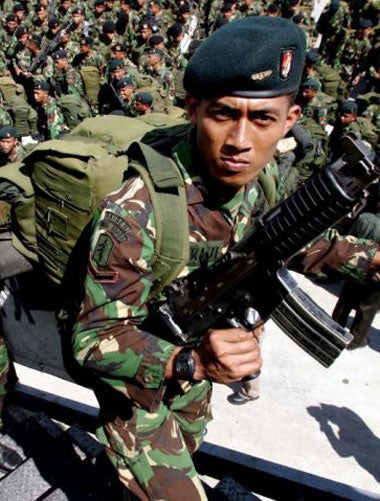Peace in wake of tsunami as last troops leave Aceh

Your support helps us to tell the story
From reproductive rights to climate change to Big Tech, The Independent is on the ground when the story is developing. Whether it's investigating the financials of Elon Musk's pro-Trump PAC or producing our latest documentary, 'The A Word', which shines a light on the American women fighting for reproductive rights, we know how important it is to parse out the facts from the messaging.
At such a critical moment in US history, we need reporters on the ground. Your donation allows us to keep sending journalists to speak to both sides of the story.
The Independent is trusted by Americans across the entire political spectrum. And unlike many other quality news outlets, we choose not to lock Americans out of our reporting and analysis with paywalls. We believe quality journalism should be available to everyone, paid for by those who can afford it.
Your support makes all the difference.The people of Aceh witnessed a sight yesterday that would have seemed unthinkable a year ago: the departure of the last of the troops sent to the remote Indonesian province to suppress an insurgency that raged for nearly three decades.
Peace was an unexpected dividend of last year's Boxing Day tsunami, which killed nearly 170,000 people in Aceh but focused attention on a civil war that few outsiders had known or cared about.
With the province in ruins and 500,000 homeless, both sides faced unprecedented pressure to end the crippling conflict. Negotiations concluded in Helsinki in August with the Indonesian government agreeing to withdraw its 24,000 non-local troops from Aceh, on the northern tip of Sumatra island. Yesterday the final batch of 3,500 left from the port of Lhokseumawe, aboard five warships and a Hercules military plane.
The troops, many from the main Indonesian island of Java, had brutalised the Acehnese population, murdering civilians and committing countless other human rights abuses. They were also engaged in extortion and drug-running, which made the province a popular posting.
The Free Aceh Movement (GAM), which also harassed and intimidated civilians, was involved in similar lucrative rackets. Sceptics warned that the peace talks - aimed at ending bloodshed estimated to have cost 15,000 lives, mainly civilians - were unlikely to be more productive than previous rounds.
Even when the deal was signed, there were doubts about whether the two sides would honour their promises. GAM renounced its demands for full independence, settling instead for broad autonomy within Indonesia, and on Tuesday, it formally dissolved its armed wing.
The rebels had already handed their weapons to an international team of monitors from the European Union and Association of South-east Asian Nations. GAM will reform as a political party and participate in regional elections next April, which it is expected to win. Former fighters have been granted amnesties. The security presence has been reduced to 14,700 soldiers and 9,100 police, all locally recruited. About 2,000 non-local police are expected this week.
For the four million Acehnese, caught so long between rebels who hid in their midst and a military force notable for its ruthlessness and brutality, this week's events have been breathtaking.Eighteen months before the tsunami, Indonesia launched its biggest military operation in the province, pledging to wipe out GAM. Civilians were terrorised as troops swept through villages, searching for rebels.
Yesterday hundreds of people assembled to watch a ceremony held to bid farewell to the last contingent of troops. The Aceh military commander, Supaidin Adi Supatra, told them: "The flame of peace is burning, and we must not let anyone extinguish it." He said the former guerrillas had the same rights as the rest of the population, and urged them to help rebuild the devastated province.
In an extraordinarily candid speech, Major-General Supaidin apologised for atrocities perpetrated by his men, saying that they had been motivated by a desire to maintain Indonesian unity.
Although this conflict erupted in 1976, Aceh has been fighting for independence since it was occupied by the Dutch in 1873. The Acehnese helped Indonesia to shake off colonial rule, but then launched a decade-long uprising in the early 1950s against Jakarta.
Join our commenting forum
Join thought-provoking conversations, follow other Independent readers and see their replies
Comments